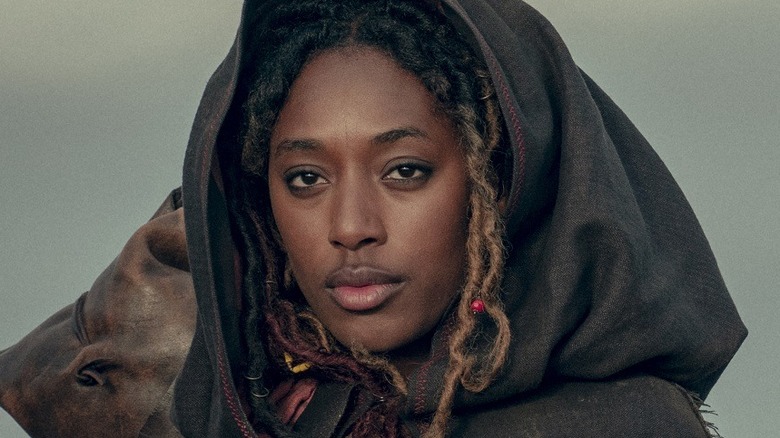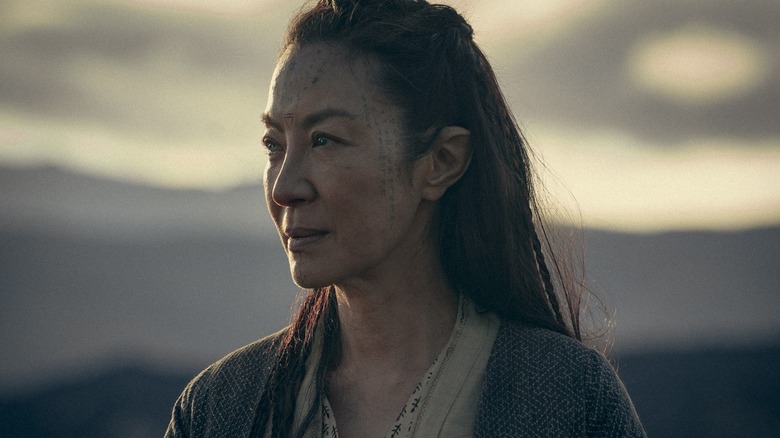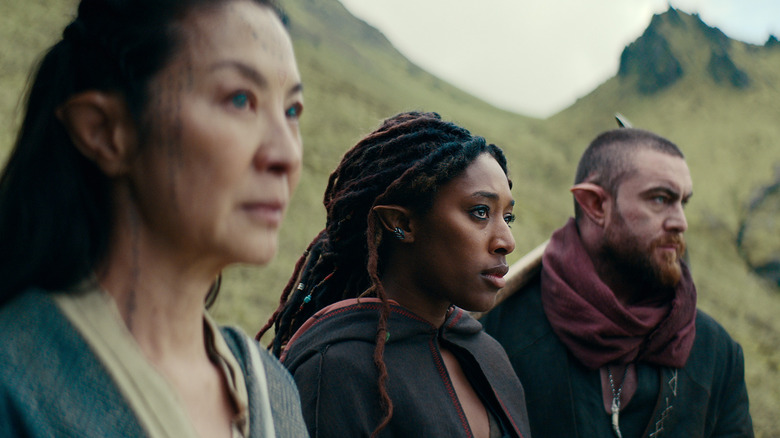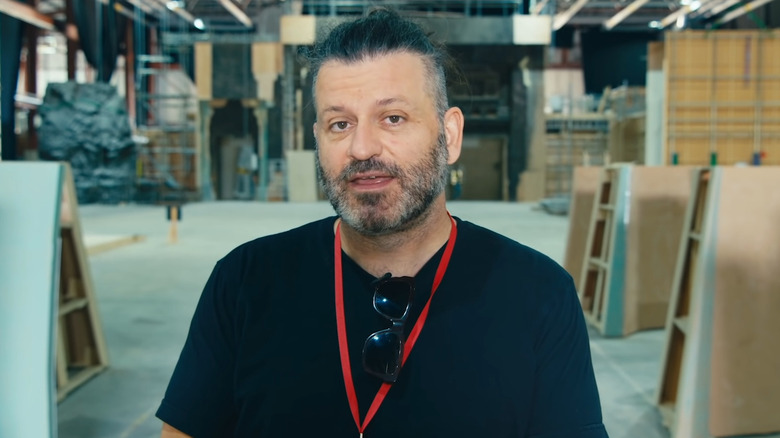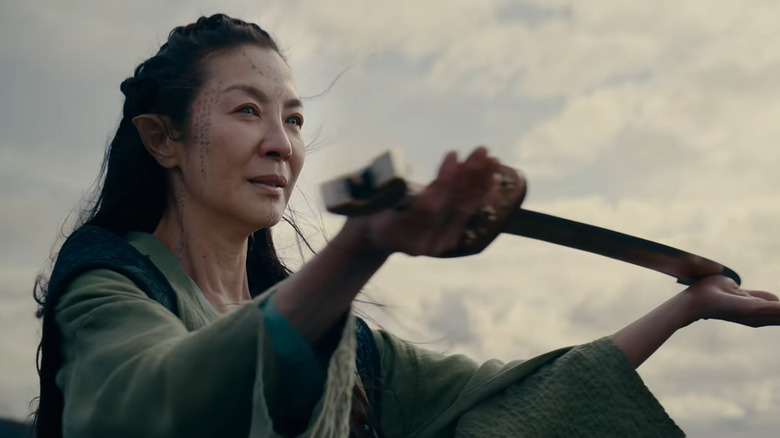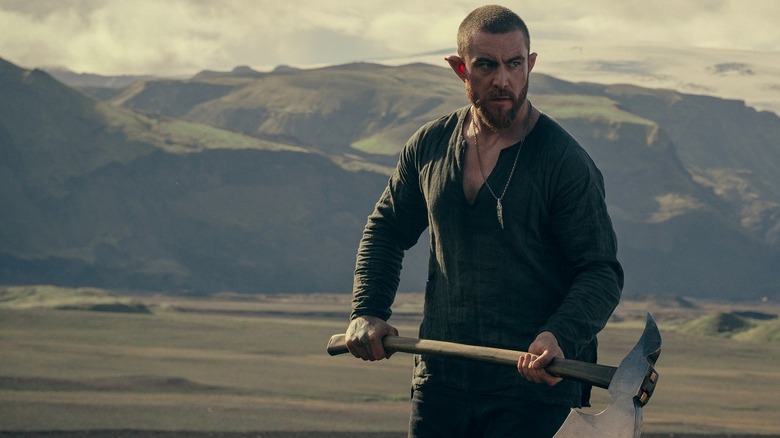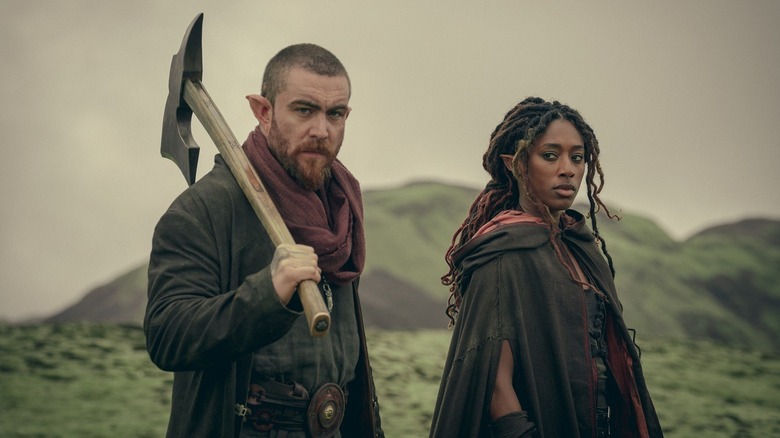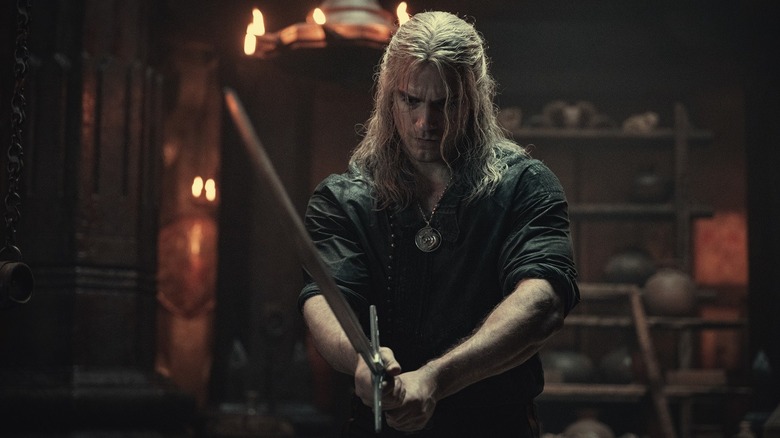The Witcher: Blood Origin - Everything You Need To Know
Get ready to travel back — way back — with "The Witcher: Blood Origin." This prequel series takes place long before Geralt of Rivia began hunting down monsters — centuries, in fact, before Witchers were even a thing. We're heading to a land where elves still run the show, before the Conjunction of the Spheres and before everything got really, really monstrous.
With "Witcher" showrunner Lauren Schmidt Hissrich acting as executive producer and novelist Andrzej Sapkowski acting as creative consultant (via ComicBook.com), the four-episode "Blood Origin" hit Netflix on December 25, 2022. This Christmas present for diehard fans is an epic journey — one of underdogs searching for justice and revenge — but if you want to learn more about the series before taking the plunge into this fantasy tale, we've got you covered. From the cast and crew to what audiences and critics think, here's everything you need to know about "The Witcher: Blood Origin."
What is the plot of The Witcher: Blood Origin?
Before we catch up with Geralt of Rivia in Season 3 of "The Witcher," we're traveling back 1,200 years in "Blood Origin." It takes place before the fabled Conjunction of the Spheres, when the elves were at the peak of their power and united under the leadership of the villainous Balor and Eredin. Of course, while it excels at science and magic, elven society is sharply divided by class and plagued by war. In the prequel series, we'll witness the final days of this world, before elven society crumbled and the Continent became a land terrorized by all manner of monsters.
In this changing landscape, the series will focus on seven ragtag heroes — all outcasts — who must band together to face a mighty empire despite their personal differences. As the official logline reads, they must "unite against an unstoppable power that took everything from them. Their blood giving rise to a prototype Witcher in a conflict that brings about the Conjunction of Spheres, when the world of monsters, men, and elves merged to become one."
What exactly is a prototype Witcher, you might ask? Speaking with Tudum, showrunner Declan de Barra explained that while Witchers weren't really a thing before humans showed up and established Witcher schools, there were still systems in place to bring about a very early version of these supernatural monster hunters. "Say, Geralt is version 13.0, the upgrade," de Barra elaborated. "Ours is the 1.0, rough and ready — the concept of a Witcher. It's the [original] model. What was the story there, and how did that get lost? And who found that critical element later?"
Who stars in The Witcher: Blood Origin?
"The Witcher" series has never been one to scrimp on big names. Superman himself, Henry Cavill, has played Geralt of Rivia for three seasons. And when he decided to step aside from the role, Liam Hemsworth of "Hunger Games" fame was hired to fill his monster-hunting boots. In addition to those two impressive stars, the original series also features top-tier talent like Anya Chalotra, Freya Allan, and Joey Batey.
Similarly, "Blood Origin" also boasts a pretty impressive cast. Perhaps the most celebrated actor of the bunch is Michelle Yeoh, best known for beloved action flicks like "Everything Everywhere All At Once" and "Crouching Tiger, Hidden Dragon" and TV shows like "Star Trek: Discovery." Here, she plays the elf Scian, an expert swordswoman who's on a quest to retrieve a stolen blade.
On Scian's journey, she's be joined by Éile, an elf raised to be a warrior and taught by Scian, only to give up her predestined future for the life of a musician. Éile is played by Sophia Brown, who's been a part of projects like "Girl/Haji" and "The Capture." A third hero, the emotional Fjall, is an ax-wielding warrior seeking revenge for someone who died in battle. He's played by Laurence O'Fuarain, who's appeared in shows similar in tone to "Blood Origin," such as "Game of Thrones, "Vikings," and "Into the Badlands."
Of course, these three won't be alone when they band together. Minnie Driver of "Good Will Hunting" fame plays Seanchai, a storyteller with the ability to shapeshift and cross both time and various worlds. Mirren Mack of "Sex Education" is Princess Merwyn, a royal destined for a future she doesn't want and who dreams of following in the footsteps of her historical hero, a female eleven warrior.
Additionally, Lenny Henry appears as the Chief Sage Balor, while Jacob Collins-Levy is Eredin Bréacc Glas, the king of the Wild Hunt, and they're joined by the likes of Lizzie Annis, Huw Novelli, Francesca Mills, Amy Murray, Nathaniel Curtis, Zach Wyatt, Dylan Moran, and Aidan O'Callaghan. Plus, Joey Batey reprises his role as Jaskier from the original "Witcher" series.
Who was the showrunner of The Witcher: Blood Origin?
A writer on "The Witcher," Declan de Barra stumbled across an interesting problem while working on the show's second season. As he explained to Tudum, "The [mystery of the] Conjunction Spheres led to this whole show because I was working 'The Witcher' Season 2, and we had a story point we couldn't fix because we needed to know what happened. What was the world before the Conjunction?"
Andrzej Sapkowski's "Witcher" novels don't really delve into the nuts and bolts of the Conjunction, so de Barra decided to figure things out himself, going so far as to map everything on a white board. And as it turns out, Netflix was very intrigued by what he developed, calling him up after Season 2 wrapped and asking if he wanted to create a prequel series based on the concepts he'd just come up with.
De Barra then sat down in a cafe and began fleshing things out on a napkin, telling Entertainment Weekly, "It was one of those rare 'David Lynch in a café' moments where the whole thing comes out in one go." And now, he's overseeing the entire show, serving as the writer and executive producer. In addition to working on both "Witcher" series, de Barra has previously written for "Iron Fist," "The Originals," and the Irish children's show "Roy," and we're super intrigued to see what magic he'll unleash in "Blood Origin."
Who directed The Witcher: Blood Origin?
With Declan de Barra as showrunner, Lauren Schmidt Hissrich as an executive producer, and Andrzej Sapkowski as the show's creative consultant, we have to ask — who directed "The Witcher: Blood Origin?" Well, according to the official Twitter account for "The Witcher," that job was split between Sarah O'Gorman and Vicky Jewson.
O'Gorman (pictured above) is no stranger to the world of "The Witcher," as she previously directed two episodes from Season 2 of the flagship show — "What Is Lost" and "Redanian Intelligence." She's also done work on other series such as "Cursed," "The Lost Kingdom," and "Jamestown." As for Jewson, she was new to the Continent when accepting the "Blood Origin" gig, but she had quite the action background, which made her perfect for the role of director. Previously, Jewson helmed the Rooney Mara thriller "Close" and the revenge flick "Born of War."
The Redanian Intelligence also reported that director Alex Garcia Lopez stepped in to handle reshoots. Lopez is definitely comfortable in the world of "The Witcher," as he directed two episodes from the flagship show's first season.
Who wrote The Witcher: Blood Origin?
As showrunner, Declan de Barra was in charge of shepherding "The Witcher: Blood Origin" where it needed to go. He was also the main writer on the series, penning the first episode by himself and co-writing the fourth and final episode. However, he wasn't the only scribe bringing this story to life, as de Barra assembled quite the writers' room.
Alongside de Barra, the fourth episode was co-written by Tasha Huo, a relatively new screenwriter with big projects in the works. In addition to "Blood Origin," she's working on an anime "Tomb Raider" series and the upcoming "Red Sonja" movie. Rounding out the "Blood Origin" writers, we also got to see scripts written by the likes of Alex Meenehan, Tania Lotia, and Kiersten Van Horne.
Meenehan served as executive story editor on "Moon Knight," Lotia has worked on "Carnival Row" and 2019's "Swamp Thing," and Van Horne has been involved with TNT's "Snowpiercer" and "South of Hell." But perhaps the show's most impressive get is Aaron Stewart-Ahn, who's twice now teamed up with director Panos Cosmatos to create some horrifically weird stuff. Most recently, they collaborated on the "Cabinet of Curiosities" episode "The Viewing," and most famously, they co-wrote the script for the wild Nicolas Cage revenge thriller "Mandy."
What is The Witcher: Blood Origin rated?
"The Witcher" isn't exactly what you might call a family-friendly show. Granted, Netflix is working on an animated series meant for kids, but other than that, it's pretty grown-up fare. Both the actual series and the animated movie, "Nightmare of the Wolf," boast the big bad TV-MA. But is "Blood Origin" any different? Does it go the same dark route as its predecessors, or does it take a tamer, lighter tone?
Well, if you're a fan of how the "Witcher" universe has been presented so far, then you don't need to be afraid. The series has earned a rating of TV-MA, thanks to gore, language, nudity, smoking, and violence. "Blood Origin" is doing it all — from exposed privates to severed limbs to gratuitous tobacco.
How are critics and audiences responding to The Witcher: Blood Origin?
Fans of "The Witcher" have had a rough time of it lately. First, Henry Cavill stepped away from the show. Second, "Blood Origin" didn't exactly live up to their expectations. As of the time of this writing, the Netflix series has a shocking 11% audience approval rating on Rotten Tomatoes based on over 4,000 reviews. It doesn't get much worse than that. The scores on IMDb are similarly awful, with just 4.1 stars out of 10 based on 18,000 reviews.
Needless to say, critics weren't crazy about "Blood Origin" either, as the series has just a 33% approval rating on Rotten Tomatoes based on 27 reviews. Ani Bundel of NBC News Think wrote, "It seems to have forgotten what made the original such an effective escapist treat," while Jonathan Wilson of Ready Steady Cut said, "The TV equivalent, in a way, of a tangentially-related hyperlink that you end up clicking while reading about something else on Wikipedia." In short, most people thought the series was an unnecessary waste of time that didn't do any justice to the original show.
Where to watch previous entries in The Witcher franchise
If you want to see what think were like before Geralt showed up, you can find "Blood Origin" on Netflix. Of course, as "Blood Origin" serves as a prequel series to the first two seasons of "The Witcher," you'll definitely want to check out the flagship show first (or revisit it if you're a diehard "Witcher" fan). Showrunner Declan de Barra promised the new series will feature plenty of Easter eggs for dedicated watchers, that it will delve into mysteries like the cause of the Conjunction and the origins of the Monoliths, and that it will set the stage for the terrifying world we've come to know (via Tudum). Whether you're brushing up on your "Witcher" history or taking the plunge for the very first time, there's only one place where you can find the original series, and that's on Netflix. That's where you can also find the animated film "Nightmare of the Wolf."
